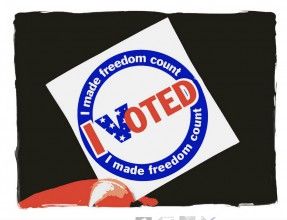Ballot initiative filing fees set to increase
 One strategy for pursuing policy changes through ballot initiatives may become victim of the new law to charge a larger fee to file an initiative for title and summary with the Attorney General’s office. The $200 filing fee, in place since 1943, will go up to $2,000 starting next year after Gov. Brown signed Assembly Bill 1100 last month. The strategic effect, however, will be less burdensome on those with deeper pockets.
One strategy for pursuing policy changes through ballot initiatives may become victim of the new law to charge a larger fee to file an initiative for title and summary with the Attorney General’s office. The $200 filing fee, in place since 1943, will go up to $2,000 starting next year after Gov. Brown signed Assembly Bill 1100 last month. The strategic effect, however, will be less burdensome on those with deeper pockets.
Filing multiple initiatives on the same subject offers proponents the opportunity to refine their proposals by getting feedback from the Legislative Analyst’s Office and Department of Finance, which must review, summarize and affix a cost estimate to any initiative. The Attorney General then attaches a title and summary to the different proposals. Proponents can see what reaction is offered to varying proposals from these government agencies, test the different versions through polling, and see which edition attracts the best donor support before deciding the version to pursue.
About 100 initiatives have been filed this year to begin the process. Each came with the $200 price tag — money that will be refunded if a measure qualifies for the ballot. A number of the measures are multiple versions on the same theme.
Most strikingly, in the last week eight versions of “The Water Supply Reliability and Drought Protection Act of 2016” were filed and five versions of “The Marijuana Control, Legalization and Revenue Act of 2016” also came in.
Former Natural Resources Agency official Jerry Meral is behind the water measures, an effort to seek more bond revenue to deal with the drought. Meanwhile the push for legalization of marijuana in California continues to heat up with different groups considering the best way to proceed.
The eight water bond proposals cost Meral $1,600 to file. Next year the price would be $16,000. When you consider ballot measure qualifying efforts cost in the millions, not to mention the expense of a campaign if an initiative makes the ballot, the increased cost of filing may seem like the proverbial gold dust that falls between the cracks of the barroom floor.
Those individuals and groups with large bank accounts will not blink at the change. Under new initiative process rules, a measure gets a legislative hearing after 25 percent of the signatures are gathered. It is possible that proponents with the wherewithal to do so could move a couple of initiatives forward so as to review the results of the feedback in the formal legislative hearings before deciding which measure to pursue.
Still, the filing fee increase is bound to change some individual and group strategies dealing with multiple filings. Those who don’t have vast resources will feel the greatest effect.
Related Articles
CalWatchdog Morning Read – November 3
Trump supporters to “watch” polls next week School construction bond in trouble? Leaked emails show strange relationship between Bay Area
Little Hoover's pension hearing
Here’s a notice for a public pension hearing by the Little Hoover Commission: On Thursday, April 22, 2010, the Little
2018 gubernatorial race already heating up
Still more than two years away, the race to succeed Gov. Jerry Brown in 2018 has already become one of the




